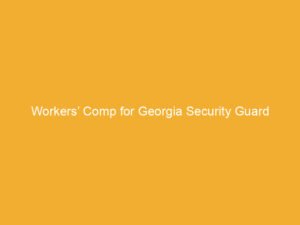
Avoiding Misclassification: Georgia Workers’ Comp Class Codes for Home Health Services
July 29, 2025
Top Workers’ Comp Safety Credits Available to Security Guard Companies
July 29, 2025Navigating workers’ compensation requirements can be a complex challenge for security guard staffing agencies operating in Georgia. With evolving regulations and industry-specific risks, ensuring compliance is critical to protecting both employees and your business from potential liabilities. This article provides a clear, streamlined overview of workers’ comp obligations tailored specifically to Georgia’s security staffing sector. By breaking down key compliance steps and practical considerations, we aim to simplify the process and help agencies maintain regulatory adherence while focusing on delivering exceptional security services.
Table of Contents
- Workers Compensation requirements for Security Guard Staffing Agencies in Georgia
- Key Compliance Challenges and How to overcome Them
- Best Practices for Managing Claims and Reducing Liability
- Effective Strategies to Ensure Ongoing Regulatory Compliance
- Q&A
- Concluding Remarks
Workers Compensation Requirements for Security Guard Staffing Agencies in Georgia
Security guard staffing agencies operating in Georgia must prioritize obtaining and maintaining workers’ compensation insurance to safeguard their workforce and meet state-mandated legal standards. Under Georgia law, companies with three or more employees are generally required to carry workers’ comp coverage, ensuring injured employees receive proper medical care and wage replacement benefits. Agencies should also be aware that subcontracted guards fall within these requirements, making thorough verification of coverage essential for compliance.Failure to comply can result in significant penalties, including fines and the potential loss of business licenses.
To streamline compliance efforts, agencies should consider the following key practices:
- Regularly review employee count to confirm coverage thresholds are met.
- Verify insurance policies with carriers to ensure coverage limits are up to date.
- Maintain clear documentation for all subcontracted personnel and independent contractors.
- Educate management on Georgia’s evolving workers’ compensation regulations.
| Requirement | Implication | Recommended Action |
|---|---|---|
| Employee Threshold (3+ employees) | Mandatory workers’ comp coverage | Track and update employee counts monthly |
| Subcontractor Inclusion | Coverage for subcontracted guards | Obtain certificates of insurance |
| Penalty for Non-Compliance | Fines and legal action | Consult legal experts and insurers regularly |
Key Compliance Challenges and How to Overcome Them
Security guard staffing agencies in Georgia face several complex compliance hurdles when managing workers’ compensation.One of the primary challenges is accurately classifying security personnel to ensure correct premium rates and coverage scope. Misclassification can led to costly audits and penalties. Additionally, the transient nature of security assignments means that agencies must maintain meticulous records to track employee locations, job duties, and injury reports in real time.Failing to do so increases exposure to non-compliance risks and potential claims disputes.
To effectively navigate these challenges, agencies should focus on key strategies:
- implement comprehensive training programs to educate staff on compliance protocols and injury reporting procedures.
- Leverage technology platforms for real-time workforce tracking and streamlined documentation management.
- Partner with specialized workers’ comp insurers that understand the unique risks and regulatory landscape of Georgia’s security industry.
| Challenge | Solution | Benefit |
|---|---|---|
| Improper Classification | Regular Audits & Training | Reduced Penalties & accurate Premiums |
| Incomplete Injury Documentation | Digital Reporting Tools | Faster Claim Resolution |
| Variable Job Assignments | Real-Time Workforce Management | Enhanced Compliance & Risk Assessment |
Best Practices for Managing Claims and Reducing Liability
Security guard staffing agencies in Georgia can mitigate risks and ensure smoother claims processing by implementing proactive strategies. Start by establishing clear interaction channels with injured employees from the onset of each claim. This ensures that all necessary documentation is submitted promptly and medical evaluations are conducted without delay. Regular training sessions on workplace safety and compliance requirements help reduce incidents, while appointing a dedicated claims coordinator fosters consistency and accountability throughout the claims lifecycle.
Moreover, investing in robust return-to-work programs can substantially decrease liability and costs. Facilitate modified duties for injured guards to expedite their reintegration into the workforce,minimizing lost workdays and maintaining morale. A structured approach to claims management might resemble the following:
| Step | Action | Benefit |
|---|---|---|
| 1 | Immediate incident reporting | Prevents documentation gaps |
| 2 | Prompt medical evaluation | Ensures accurate injury assessment |
| 3 | Regular follow-ups | Tracks recovery progress |
| 4 | Return-to-work program | Reduces indemnity costs |
Consistency paired with vigilance creates a claims habitat that not only protects your agency’s bottom line but also upholds a commitment to employee well-being. Emphasize continuous enhancement by also analyzing claim trends periodically and adjusting safety protocols accordingly. This dynamic approach will help maintain compliance and build a resilient security workforce ready to face the unique challenges within Georgia’s labor landscape.
Effective Strategies to Ensure Ongoing Regulatory Compliance
Maintaining adherence to regulatory mandates requires a proactive and systematic approach. Agencies must begin by regularly auditing their compliance protocols to identify discrepancies or emerging challenges. Implementing ongoing staff training programs focused on the latest state and federal workers’ compensation laws ensures that everyone-from management to the security personnel on the ground-understands their roles and responsibilities clearly. Additionally, leveraging technology such as compliance management software can automate tracking deadlines, documenting training sessions, and managing claims efficiently, reducing the likelihood of costly oversights.
Another pivotal strategy involves fostering strong partnerships with legal experts and insurance providers who specialize in Georgia’s security staffing sector. Working with seasoned professionals allows agencies to stay informed of policy updates and anticipate regulatory shifts. Consider the following best practices to enhance compliance consistently:
- Develop detailed compliance checklists customized for workforce-specific regulations.
- Establish clear communication channels for reporting workplace injuries promptly.
- Schedule periodic risk assessments to minimize incidents that could trigger workers’ comp claims.
- Document all compliance efforts meticulously to simplify audits and regulatory review.
| Strategy | Benefit | Implementation Tip |
|---|---|---|
| Ongoing Training | enhances staff knowledge | Use modular, role-specific workshops |
| Compliance Audits | Detects gaps early | Schedule quarterly reviews |
| Legal Partnerships | Ensures up-to-date guidance | Retain local compliance specialists |
Q&A
Q&A: Workers’ Comp for Georgia Security Guard Staffing Agencies-Compliance Simplified
Q1: What is workers’ compensation, and why is it vital for security guard staffing agencies in Georgia?
A1: Workers’ compensation is a form of insurance that provides medical benefits and wage replacement to employees injured during employment. For Georgia security guard staffing agencies, it is indeed crucial to ensure compliance with state laws, protect employees, mitigate financial risks from workplace injuries, and maintain a reputable business standard.
Q2: Are security guards considered employees or independent contractors regarding workers’ compensation in Georgia?
A2: Typically, security guards placed by staffing agencies are classified as employees of the agency, not independent contractors. This classification means the agency is responsible for providing workers’ compensation coverage for those individuals.
Q3: What are the workers’ compensation insurance requirements for security guard staffing agencies in Georgia?
A3: Georgia law requires most employers with three or more employees to carry workers’ compensation insurance. As security guards are employees of staffing agencies, these agencies must obtain proper coverage to comply with the law and ensure guards are protected on the job.
Q4: How can Georgia security guard staffing agencies simplify compliance with workers’ compensation regulations?
A4: Agencies can simplify compliance by partnering with specialized insurance providers familiar with the unique risks of the security industry, maintaining accurate payroll and employee records, conducting regular safety training, and staying updated with changes in Georgia workers’ compensation laws.
Q5: What are the risks of non-compliance with workers’ compensation requirements for these agencies?
A5: Non-compliance can lead to legal penalties, fines, increased liability exposure, loss of contracts, and damage to the agency’s reputation. Additionally, without proper coverage, the agency may face significant financial burdens if an employee is injured.
Q6: Are there any specific considerations for claims management in the security guard staffing sector?
A6: Yes,managing claims effectively requires prompt reporting of injuries,clear communication between the staffing agency,client,medical providers,and insurers,and proactive return-to-work programs. This approach helps control costs and supports the employee’s recovery.
Q7: How does workers’ compensation support the operational success of a security guard staffing agency in Georgia?
A7: Proper workers’ compensation coverage safeguards employee well-being, reduces financial uncertainty, enhances client trust, and ensures regulatory compliance. this foundation allows agencies to focus on delivering quality security services and growing their business sustainably.
This Q&A is designed to provide clear,professional insights for Georgia security guard staffing agencies seeking to streamline their workers’ compensation compliance.
Concluding Remarks
navigating workers’ compensation requirements for security guard staffing agencies in Georgia doesn’t have to be a complex endeavor. By understanding the state-specific regulations and partnering with knowledgeable insurance providers, agencies can ensure full compliance while safeguarding their workforce and minimizing liability. Simplifying workers’ comp processes not only promotes operational efficiency but also reinforces a commitment to employee well-being-an essential component for sustained success in the competitive security services industry. Stay informed, stay compliant, and position your agency for growth with confidence.
“This content was generated with the assistance of artificial intelligence. While we strive for accuracy, AI-generated content may not always reflect the most current information or professional advice. Users are encouraged to independently verify critical information and, where appropriate, consult with qualified professionals, lawyers, state statutes and regulations & NCCI rules & manuals before making decisions based on this content.

